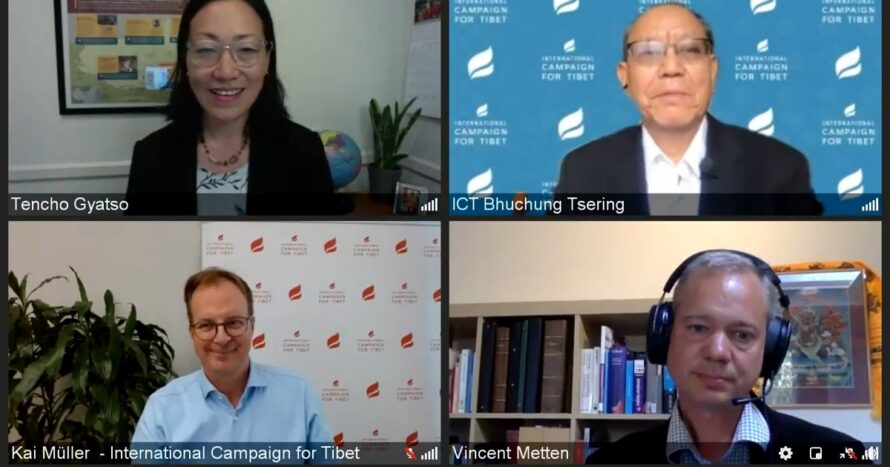Leaders of the International Campaign for Tibet on both sides of the Atlantic answered questions from ICT members and the wider public during a virtual Town Hall this week.
The “Town Hall with ICT Leaders” featured ICT Interim President Bhuchung K. Tsering in Washington, DC; ICT EU Policy Director Vincent Metten in Brussels; and ICT Germany Executive Director Kai Mueller in Berlin. The event streamed live on ICT’s websites and Facebook pages on 22 September 2021 as part of the organization’s “Tibet Talks” speaker series.

Tencho Gyatso, ICT’s interim vice president, moderated the discussion, which focused on questions from the audience about the situation in Tibet—which the Chinese government’s decades-long occupation has turned into the least-free country on Earth alongside Syria—the work of ICT and the plans of the organization.
The event was “an opportunity for ICT as a whole to inform the general public about what we do in our different offices,” Tsering said.
United States
In his opening remarks, Tsering laid out the efforts of ICT’s team in Washington, which has advocated for Tibet in the US government for more than 30 years.
Tsering noted that over that time, support for Tibet has become institutionalized in US law—including through millions of dollars in US funding for Tibetan programs every year—while a significant number of Tibetans have become citizens of the United States and other Western countries.
“We have been using that power of citizenship to encourage Tibetan empowerment here,” Tsering said, “so that Tibetan Americans can be part of the political process of the United States.”
One part of that has been ICT’s Tibet Lobby Day, which this year will take place next week on Sept. 28 and 29. The event will see ICT members, Tibetan Associations, and Tibet supporters from more than 20 states meet virtually with their Congressional offices to push for continuing US government action on Tibet.
Tsering said the Biden administration has legal mandates to push for renewed dialogue between the Chinese government and the representatives of the Dalai Lama, which is a major goal of the Tibet movement.
“We are currently working with the Congress and with the administration to see that the Biden administration follows up on these mandates,” Tsering said, “as well as on the commitments by then-presidential candidate Joe Biden in September 2020.”
Europe
Metten, ICT’s EU policy director, began his remarks by saying that Europe is not a monolith. The European Union has 27 member states with different political sensitivities and approaches toward China.
Former communist countries in Eastern Europe tend to be allies of the Tibetan people, Metten said, while other nations like Greece and Hungary align more closely with Beijing for economic reasons and have for instance blocked EU statements criticizing the human rights situation in China at the UN Human Rights Council.
“There is a lack of unity and coherency when it comes to sensitive issues in China like Tibet, Hong Kong, Taiwan or Xinjiang,” Metten said.
He said more European countries should raise Tibet in bilateral relations with China, rather than leave discussions about Tibetan issues to the EU-China Human Rights Dialogue.
Metten added that parliaments at both the EU and national levels are more outspoken on Tibetan human rights than national governments are. Several parliaments also have Tibet intergroups that bring together parliamentarians from different political parties to take action on Tibet.
“I would say that today, the EU is less naïve than it used to be in the past,” Metten said. “China is simultaneously depicted as a cooperation partner, but also as an economic competitor and as a systemic rival. This is a new expression that has irritated very much Beijing.”
United Nations
Mueller, ICT Germany’s executive director, said that many of Metten’s comments about Europe as a whole apply to Germany, where ICT’s Berlin staff devote a great deal of energy to advocating for Tibet at the United Nations.
Mueller noted that just recently, four independent UN human rights experts and bodies raised serious concerns in a communication to the Chinese government about the cases of Tibetan monks Rinchen Tsultrim and Go Sherab Gyatso. Both have been in detention for over a year, though it’s unclear where or why.
While those are just two out of the more than 270 Tibetan political prisoners, Mueller said the communication from the UN experts was an encouraging sign.
“This is exactly what we aim to achieve,” Mueller said. “We want to address human rights bodies and independent experts at the United Nations level to take up these cases, ultimately of course to reach an improvement in the situation of those who are detained and those who are disappeared.”
Mueller noted that although China has blocked outsiders’ access to Tibet and somewhat successfully misled the international public about its policies in Tibet, his own life experiences have showed him the urgency of promoting self-determination and resisting authoritarian rule.
“As a German, I would dare to say that as with our country some 30 years ago, the winds of change may come quickly and unexpectedly,” he said. “That is an encouraging experience I would like to share with our Tibetan friends and also with you out there.”
Audience questions
After their opening remarks, the three ICT speakers took questions from the audience about a range of topics, including the upcoming UN Climate Change Conference, known as COP26; the 2022 Beijing Olympics; the status of Tibet’s missing Panchen Lama; the succession of the Dalai Lama; and the difficulty of getting attention for Tibet.
Watch the full Town Hall below.